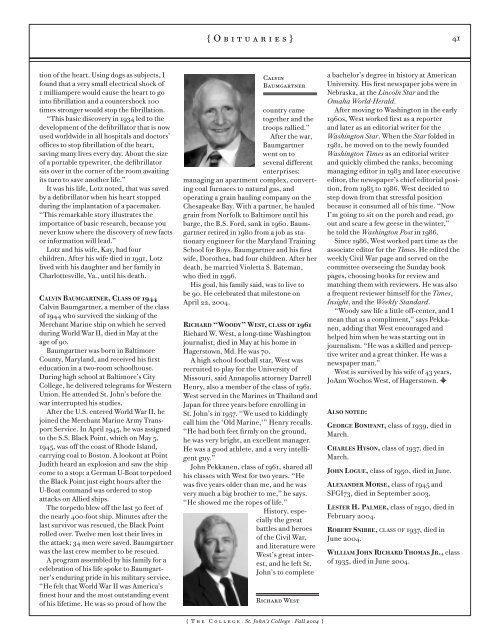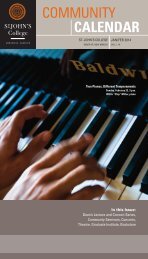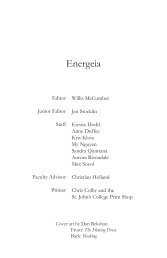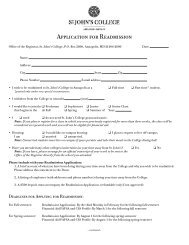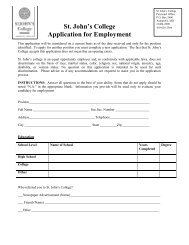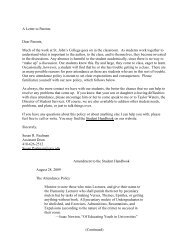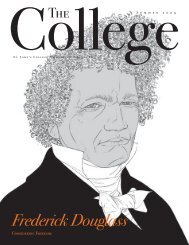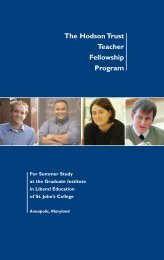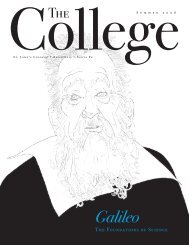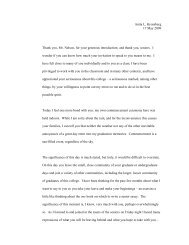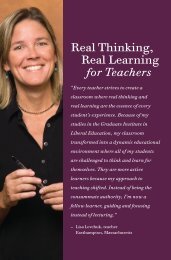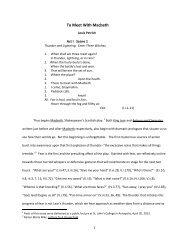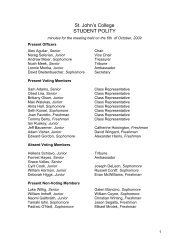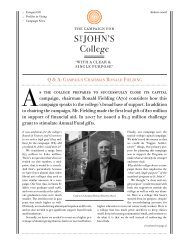Magazine - summer 03 - St. John's College
Magazine - summer 03 - St. John's College
Magazine - summer 03 - St. John's College
You also want an ePaper? Increase the reach of your titles
YUMPU automatically turns print PDFs into web optimized ePapers that Google loves.
{Obituaries} 41<br />
tion of the heart. Using dogs as subjects, I<br />
found that a very small electrical shock of<br />
1 milliampere would cause the heart to go<br />
into fibrillation and a countershock 100<br />
times stronger would stop the fibrillation.<br />
“This basic discovery in 1934 led to the<br />
development of the defibrillator that is now<br />
used worldwide in all hospitals and doctors’<br />
offices to stop fibrillation of the heart,<br />
saving many lives every day. About the size<br />
of a portable typewriter, the defibrillator<br />
sits over in the corner of the room awaiting<br />
its turn to save another life.”<br />
It was his life, Lotz noted, that was saved<br />
by a defibrillator when his heart stopped<br />
during the implantation of a pacemaker.<br />
“This remarkable story illustrates the<br />
importance of basic research, because you<br />
never know where the discovery of new facts<br />
or information will lead.”<br />
Lotz and his wife, Kay, had four<br />
children. After his wife died in 1991, Lotz<br />
lived with his daughter and her family in<br />
Charlottesville, Va., until his death.<br />
CALVIN BAUMGARTNER, CLASS OF 1944<br />
Calvin Baumgartner, a member of the class<br />
of 1944 who survived the sinking of the<br />
Merchant Marine ship on which he served<br />
during World War II, died in May at the<br />
age of 90.<br />
Baumgartner was born in Baltimore<br />
County, Maryland, and received his first<br />
education in a two-room schoolhouse.<br />
During high school at Baltimore’s City<br />
<strong>College</strong>, he delivered telegrams for Western<br />
Union. He attended <strong>St</strong>. John’s before the<br />
war interrupted his studies.<br />
After the U.S. entered World War II, he<br />
joined the Merchant Marine Army Transport<br />
Service. In April 1945, he was assigned<br />
to the S.S. Black Point, which on May 5,<br />
1945, was off the coast of Rhode Island,<br />
carrying coal to Boston. A lookout at Point<br />
Judith heard an explosion and saw the ship<br />
come to a stop: a German U-Boat torpedoed<br />
the Black Point just eight hours after the<br />
U-Boat command was ordered to stop<br />
attacks on Allied ships.<br />
The torpedo blew off the last 50 feet of<br />
the nearly 400-foot ship. Minutes after the<br />
last survivor was rescued, the Black Point<br />
rolled over. Twelve men lost their lives in<br />
the attack; 34 men were saved. Baumgartner<br />
was the last crew member to be rescued.<br />
A program assembled by his family for a<br />
celebration of his life spoke to Baumgartner’s<br />
enduring pride in his military service.<br />
“He felt that World War II was America’s<br />
finest hour and the most outstanding event<br />
of his lifetime. He was so proud of how the<br />
Calvin<br />
Baumgartner<br />
country came<br />
together and the<br />
troops rallied.”<br />
After the war,<br />
Baumgartner<br />
went on to<br />
several different<br />
enterprises:<br />
managing an apartment complex, converting<br />
coal furnaces to natural gas, and<br />
operating a grain hauling company on the<br />
Chesapeake Bay. With a partner, he hauled<br />
grain from Norfolk to Baltimore until his<br />
barge, the B.S. Ford, sank in 1960. Baumgartner<br />
retired in 1980 from a job as stationary<br />
engineer for the Maryland Training<br />
School for Boys. Baumgartner and his first<br />
wife, Dorothea, had four children. After her<br />
death, he married Violetta S. Bateman,<br />
who died in 1996.<br />
His goal, his family said, was to live to<br />
be 90. He celebrated that milestone on<br />
April 22, 2004.<br />
RICHARD “WOODY” WEST, CLASS OF 1961<br />
Richard W. West, a long-time Washington<br />
journalist, died in May at his home in<br />
Hagerstown, Md. He was 70.<br />
A high school football star, West was<br />
recruited to play for the University of<br />
Missouri, said Annapolis attorney Darrell<br />
Henry, also a member of the class of 1961.<br />
West served in the Marines in Thailand and<br />
Japan for three years before enrolling in<br />
<strong>St</strong>. John’s in 1957. “We used to kiddingly<br />
call him the ‘Old Marine,’” Henry recalls.<br />
“He had both feet firmly on the ground,<br />
he was very bright, an excellent manager.<br />
He was a good athlete, and a very intelligent<br />
guy.”<br />
John Pekkanen, class of 1961, shared all<br />
his classes with West for two years. “He<br />
was five years older than me, and he was<br />
very much a big brother to me,” he says.<br />
“He showed me the ropes of life.”<br />
History, especially<br />
the great<br />
battles and heroes<br />
of the Civil War,<br />
and literature were<br />
West’s great interest,<br />
and he left <strong>St</strong>.<br />
John’s to complete<br />
Richard West<br />
a bachelor’s degree in history at American<br />
University. His first newspaper jobs were in<br />
Nebraska, at the Lincoln <strong>St</strong>ar and the<br />
Omaha World-Herald.<br />
After moving to Washington in the early<br />
1960s, West worked first as a reporter<br />
and later as an editorial writer for the<br />
Washington <strong>St</strong>ar. When the <strong>St</strong>ar folded in<br />
1981, he moved on to the newly founded<br />
Washington Times as an editorial writer<br />
and quickly climbed the ranks, becoming<br />
managing editor in 1983 and later executive<br />
editor, the newspaper’s chief editorial position,<br />
from 1985 to 1986. West decided to<br />
step down from that stressful position<br />
because it consumed all of his time. “Now<br />
I’m going to sit on the porch and read, go<br />
out and scare a few geese in the winter,”<br />
he told the Washington Post in 1986.<br />
Since 1986, West worked part time as the<br />
associate editor for the Times. He edited the<br />
weekly Civil War page and served on the<br />
committee overseeing the Sunday book<br />
pages, choosing books for review and<br />
matching them with reviewers. He was also<br />
a frequent reviewer himself for the Times,<br />
Insight, and the Weekly <strong>St</strong>andard.<br />
“Woody saw life a little off-center, and I<br />
mean that as a compliment,” says Pekkanen,<br />
adding that West encouraged and<br />
helped him when he was starting out in<br />
journalism. “He was a skilled and perceptive<br />
writer and a great thinker. He was a<br />
newspaper man.”<br />
West is survived by his wife of 43 years,<br />
JoAnn Wochos West, of Hagerstown. x<br />
ALSO NOTED:<br />
GEORGE BONIFANT, class of 1939, died in<br />
March.<br />
CHARLES HYSON, class of 1937, died in<br />
March.<br />
JOHN LOGUE, class of 1950, died in June.<br />
ALEXANDER MORSE, class of 1945 and<br />
SFGI73, died in September 20<strong>03</strong>.<br />
LESTER H. PALMER, class of 1930, died in<br />
February 2004.<br />
ROBERT SNIBBE, CLASS OF 1937, died in<br />
June 2004.<br />
WILLIAM JOHN RICHARD THOMAS JR., class<br />
of 1935, died in June 2004.<br />
{ The <strong>College</strong> • <strong>St</strong>. John’s <strong>College</strong> • Fall 2004 }


